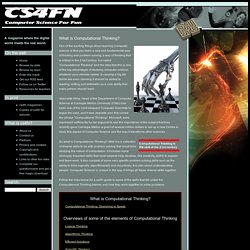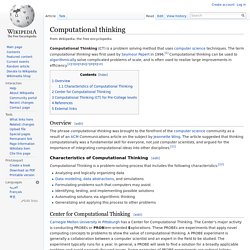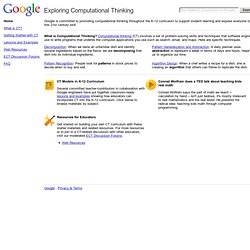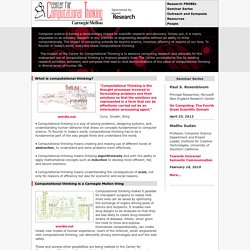

Computational thinking and thinking about computing. Jeannette M. Wing - Computational Thinking and Thinking About Computing. What is Computational Thinking? One of the exciting things about learning Computer science is that you learn a new and fundamental way of thinking and problem solving; a way of thinking that is critical in the 21st Century.

It is called "Computational Thinking" and the idea that this is one of the big advantages of studying computer science, whatever your ultimate career, is causing a big stir. Some are even claiming it should be added to reading, writing and arithmetic as a core ability that every person should learn. Jeannette Wing, Head of the Department of Computer Science at Carnegie Mellon University (CMU) has been one of the most eloquent Computer Scientists to argue the case, and it was Jeanette who first coined the phrase "Compuational Thinking". Computational Thinking is the skill of the 21st century So what is Computational Thinking? Follow the links below for a cs4fn guide to some of the skills that fall under the Computational Thinking banner and how they work together to solve problems.
Computational thinking. Computational Thinking (CT) is a problem solving method that uses computer science techniques.

The term computational thinking was first used by Seymour Papert in 1996.[1] Computational thinking can be used to algorithmically solve complicated problems of scale, and is often used to realize large improvements in efficiency.[2][3][4][5][6][7][8][9][10] Overview[edit] The phrase computational thinking was brought to the forefront of the computer science community as a result of an ACM Communications article on the subject by Jeannette Wing. The article suggested that thinking computationally was a fundamental skill for everyone, not just computer scientists, and argued for the importance of integrating computational ideas into other disciplines.[11] Characteristics of Computational Thinking[edit] Computational Thinking is a problem-solving process that includes the following characteristics:[12] Center for Computational Thinking[edit] Computational Thinking (CT) for Pre-College levels[edit]
Exploring Computational Thinking. Google is committed to promoting computational thinking throughout the K-12 curriculum to support student learning and expose everyone to this 21st century skill.

What is Computational Thinking? Computational thinking (CT) involves a set of problem-solving skills and techniques that software engineers use to write programs that underlie the computer applications you use such as search, email, and maps. Here are specific techniques. Decomposition: When we taste an unfamiliar dish and identify several ingredients based on the flavor, we are decomposing that dish into its individual ingredients. Pattern Recognition: People look for patterns in stock prices to decide when to buy and sell. CT Models in K-12 Curriculum Several committed teacher-contributors in collaboration with Google engineers have put together classroom-ready lessons and examples showing how educators can incorporate CT into the K-12 curriculum. Resources for Educators Web Resources. Center for Computational Thinking, Carnegie Mellon.
What is computational thinking?

"Computational Thinking is the thought processes involved in formulating problems and their solutions so that the solutions are represented in a form that can be effectively carried out by an information-processing agent. " Cuny, Snyder, Wing Computational thinking is a way of solving problems, designing systems, and understanding human behavior that draws on concepts fundamental to computer science.
To flourish in today's world, computational thinking has to be a fundamental part of the way people think and understand the world. Computational thinking means creating and making use of different levels of abstraction, to understand and solve problems more effectively. Www.cs.cmu.edu/afs/cs/usr/wing/www/publications/Wing06.pdf.